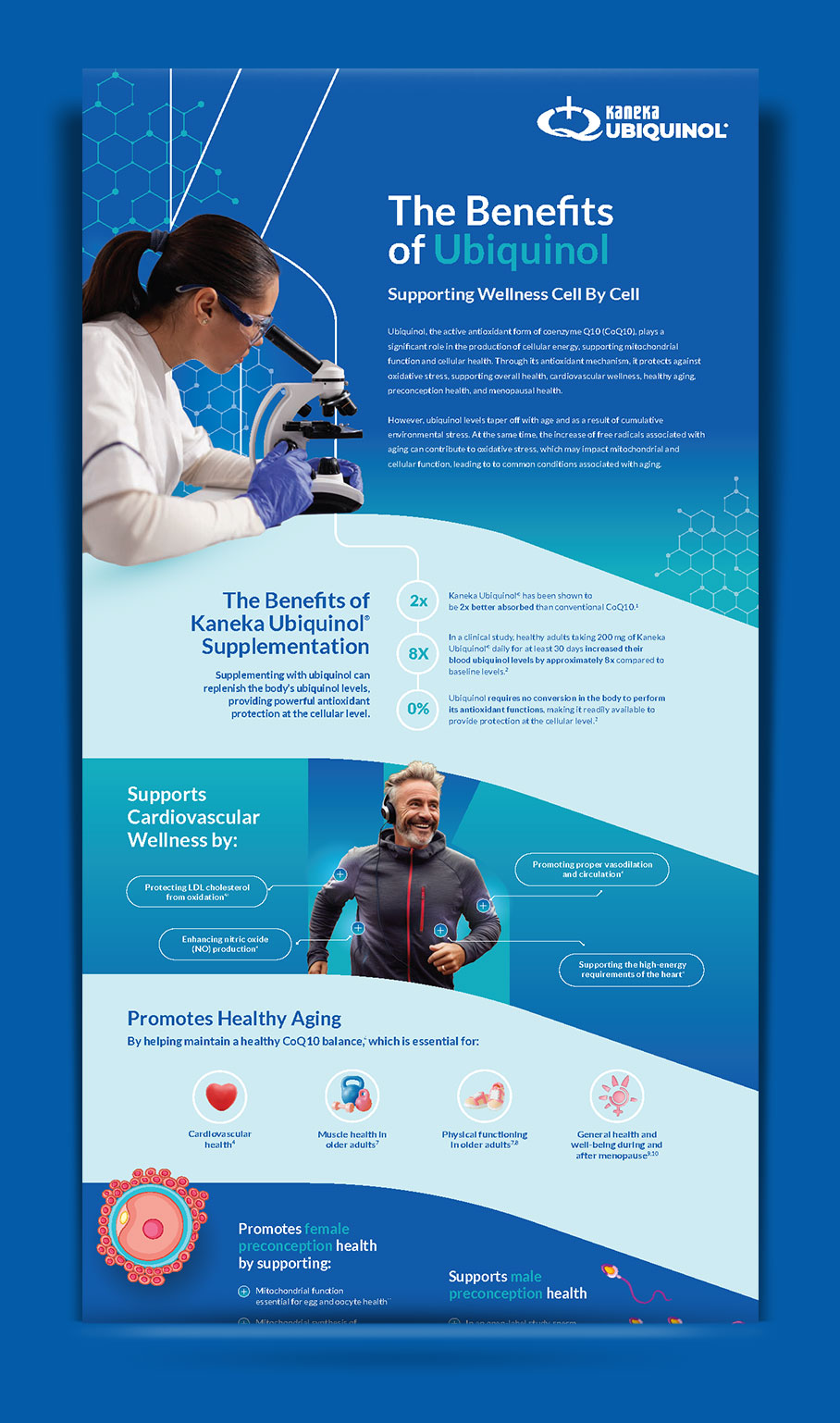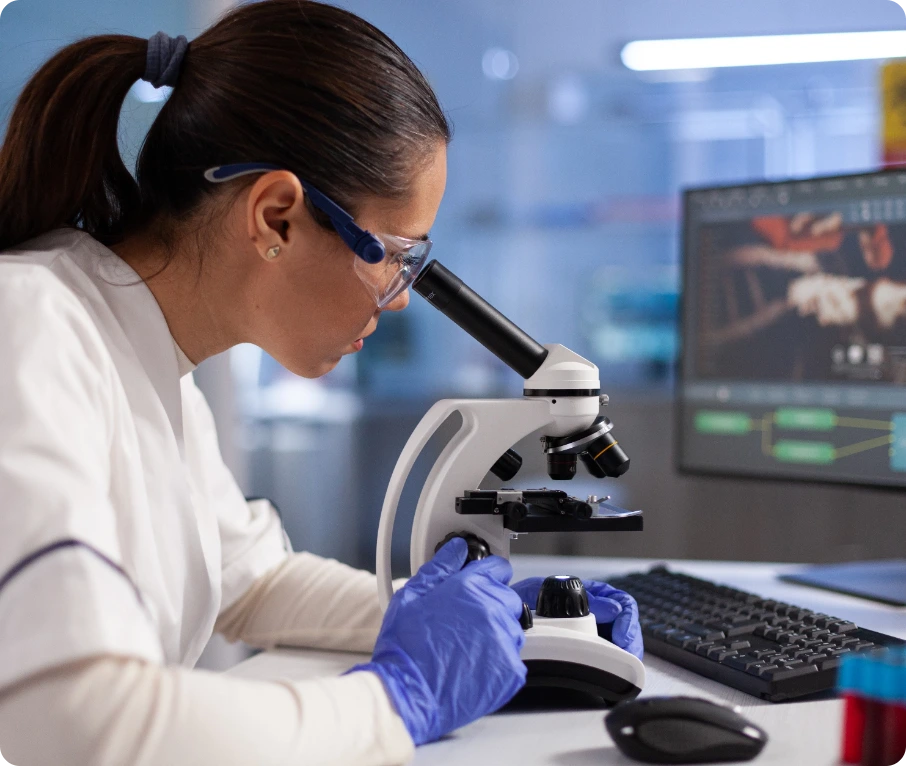
Kaneka Ubiquinol®
An Ally in Overall Wellness
Ubiquinol, the active antioxidant form of Coenzyme Q10 (CoQ10), is found naturally throughout our bodies. It is essential for cellular function and antioxidant support, aiding physiological processes vital for overall health. With age, ubiquinol levels and antioxidant mechanisms decline, which can elevate oxidative stress, damaging healthy cells and mitochondria and leading to common age-related conditions.1,2

Ubiquinol is required for 95% of cellular energy (ATP) production.3
Kaneka Ubiquinol® is 2x better absorbed than conventional CoQ10.4

Supplementation with 100 mg – 200 mg Kaneka Ubiquinol® is shown to increase baseline ubiquinol levels in healthy younger adults by 5x-8x.5

The World’s First and Only Patented Ubiquinol Ingredient
Kaneka Nutrients is the trusted manufacturer of Kaneka Ubiquinol®, a pure, yeast-fermented Ubiquinol ingredient that is bioidentical to naturally occurring ubiquinol. It has a well-established safety profile as demonstrated by extensive clinical trial data. Kaneka Ubiquinol® is manufactured under rigorous quality controls and safety standards and is the highest quality Ubiquinol ingredient on the market.

Stabilized Kaneka Ubiquinol® Powder
Ubiquinol is prone to oxidation when exposed to air, requiring a barrier with low oxygen permeability for protection. To ensure its stability, Kaneka developed a proprietary encapsulation method utilizing fluid bed drying technology. The result is Kaneka Q30®, a 30% concentrated powder that retains all the benefits of Kaneka Ubiquinol® in an air-stable form. It’s suitable for capsules, stick packs, nutrition bars, powdered beverages, and various solid food types. Discover how our research-to-development process supports innovative formats.
Supporting Healthy Aging Processes
With age, the body’s ubiquinol levels and antioxidant mechanisms decline and the ability to convert CoQ10 into ubiquinol diminishes, which can lead to oxidative stress and compromised mitochondrial function. Through its antioxidant properties, ubiquinol helps maintain mitochondrial health and proper function — vital for healthy aging. Clinical research demonstrates the importance of older adults maintaining adequate serum ubiquinol levels, which correlates with healthy5,6:
Cardiovascular
function6

Muscle
strength7
Physical
functioning8


Promoting Cardiovascular Health
Ubiquinol is a lipid-soluble antioxidant that is required for 95% of cellular energy production.1 Supplementation with Kaneka Ubiquinol® promotes heart health by aiding cellular energy production and providing antioxidant protection. Research demonstrates that Kaneka Ubiquinol®
- Promotes vessel health6
- Protects cells from oxidative stress9-11
- Replenishes CoQ10 blood levels depleted by statin medicines12,13
Supporting Preconception Health
Supplementation with Kaneka Ubiquinol® promotes preconception health by supporting mitochondrial function and cellular energy production and protecting reproductive cells against oxidative stress. Ubiquinol provides strong antioxidant support to neutralize oxidative stress that can affect sperm and egg quality. Studies show Kaneka Ubiquinol® further promotes male preconception health, demonstrating:
26%
improvement in sperm motility14
53%
increase in sperm count14
19%
improvement in sperm morphology15

KANEKA UBIQUINOL®
Backed by 30+ Years of Scientific Research
Kaneka Ubiquinol® is the subject of 85+ clinical research studies. Kaneka Ubiquinol® is a trusted brand of Ubiquinol used by researchers in clinical trials funded by the National Institutes of Health.
Get the Kaneka Ubiquinol® Advantage
With a reputation for setting the industry standard, Kaneka supports nutritional supplement and food and beverage manufacturers with the premium Ubiquinol ingredients needed to offer consumers the high-quality products they are seeking.
Partner With Kaneka Nutrients
- Bratic A, Larsson NG. The role of mitochondria in aging. J Clin Invest. 2013 Mar;123(3):951-7.
- Pallotti F, Bergamini C, Lamperti C, Fato R. The Roles of Coenzyme Q in Disease: Direct and Indirect Involvement in Cellular Functions. Int J Mol Sci. 2021;23(1):128. Published 2021 Dec 23.
- Martini FH. Muscle tissue. In: Fundamentals of Anatomy and Physiology, Prentice Hall, Inc, Upper Saddle River, New Jersey, 12th edition.
- Langsjoen PH, Langsjoen AM. Comparison study of plasma coenzyme Q10 levels in healthy subjects supplemented with ubiquinol versus ubiquinone. Clin Pharmacol Drug Dev. 2014;3(1):13-17.
- Hosoe K, Kitano M, Kishida H, et al. Study on safety and bioavailability of ubiquinol (Kaneka QH) after single and 4-week multiple oral administration to healthy volunteers. Regul Toxicol Pharmacol. 2007 Feb;47(1):19-28.
- Sabbatinelli J, Orlando P, Galeazzi R, et al. Ubiquinol Ameliorates Endothelial Dysfunction in Subjects with Mild-to-Moderate Dyslipidemia: A Randomized Clinical Trial. Nutrients. 2020;12(4):1098. Published 2020 Apr 15.
- Fischer A, Onur S, Niklowitz P, et al. Coenzyme Q10 Status as a Determinant of Muscular Strength in Two Independent Cohorts. PLoS One. 2016;11(12):e0167124. Published 2016 Dec 1.
- de la Bella-Garzón R, Fernández-Portero C, Alarcón D, et al. Levels of plasma coenzyme Q10 are associated with physical capacity and cardiovascular risk in the elderly. Antioxidants (Basel). 2022 Jan 29;11(2):279.
- Becker WM, Deamer DW. Energy from Chemical Bonds: The aerobic mode. In: The World of the Cell, 2nd Ed. The Benjamin/Cummings Series in the Life Sciences. 1991.
- Ernster L, Forsmark-Andrée P. Ubiquinol: an endogenous antioxidant in aerobic organisms. J Clin Invest. 1993;71(8 Suppl):S60-5.
- Forsmark-Andrée P, Lee CP, Dallner G, et al. Lipid peroxidation and changes in the ubiquinone content and the respiratory chain enzymes of submitochondrial particles. Free Radic Biol Med. 1997;22(3):391-400.
- Zlatohlavek L, Vrablik M, Grauova B, et al. The effect of coenzyme Q10 in statin myopathy. Neuro Endocrinol Lett. 2012;33 Suppl 2:98-101.
- Fedacko J, Pella D, Fedackova P, et al. Coenzyme Q(10) and selenium in statin-associated myopathy treatment. Can J Physiol Pharmacol. 2013 Feb;91(2):165-70.
- Thakur AS, Litarru GP, Funahashi I, et al. Effect of Ubiquinol therapy on sperm parameters and serum testosterone levels in Oligoasthenozoospermic infertile men. J Clin Diagn Res. 2015;9(9):BC01-BC03.
- Cakiroglu B, Eyyupoglu SE, Gozukucuk R, Uyanik BS. Ubiquinol effect on sperm parameters in subfertile men who have astheno-teratozoospermia with normal sperm concentration. Nephro Urol Mon. 2014;6(3):e16870.
These statements have not been evaluated by the Food and Drug Administration.
This product is not intended to diagnose, treat, cure, or prevent any disease.



